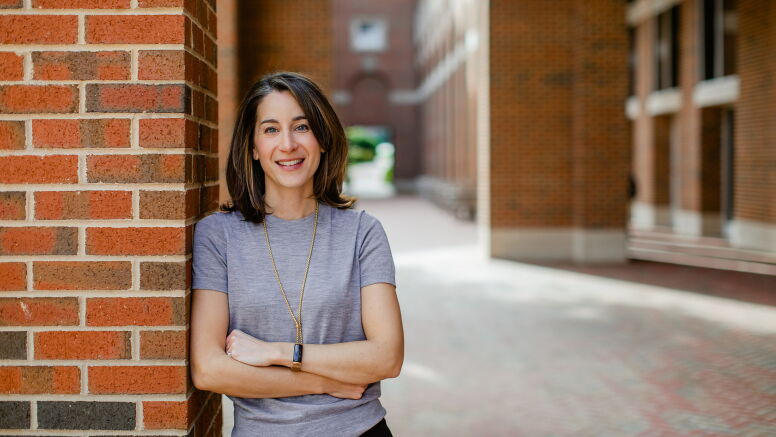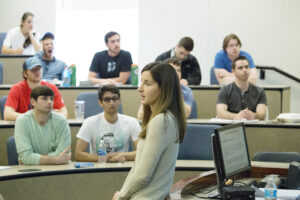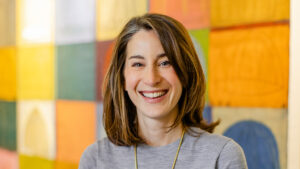News & Stories
Walking the talk of teamwork and collaboration

Professor Jessica Siegel Christian came to UNC Kenan-Flagler Business School for love.
Her husband, Michael Christian, joined the UNC Kenan-Flagler faculty in 2010 after earning his PhD in organizational behavior from the University of Arizona, where she also was a doctoral student. When she graduated a year later, she conducted a targeted job search that led her to UNC Kenan-Flagler.
Then she also fell in love with UNC Kenan-Flagler.
“Once I started to meet the people in the group and got to know the students, it was a pretty easy fit,” says Christian. “I love the culture and everyone I work with.”
The feelings are mutual. Christian won All-Star MBA teaching awards in 2020, 2019 and 2018, in the Full-Time MBA Program. She also is a favorite undergraduate professor: She was selected by Poets & Quants as one of the best undergraduate business professors of 2022.
Today most of her teaching is in the Undergraduate Business Program. She teaches Intro to Organizational Behavior, a core course which introduces many concepts, including work behaviors, personalities at work and why they matter, how to motivate others and how to lead change at work. She also teaches the Negotiations elective, where students “delve into the weeds of the topic” and learn about different negotiations tactics and styles.
 In both courses, Christian relates the work to students’ lives, so they recognize ways to immediately apply what they are learning. For example, in the introductory course, she demonstrates how understanding people’s motivations can be useful when playing on a club sports team or taking on a leadership role in a campus organization.
In both courses, Christian relates the work to students’ lives, so they recognize ways to immediately apply what they are learning. For example, in the introductory course, she demonstrates how understanding people’s motivations can be useful when playing on a club sports team or taking on a leadership role in a campus organization.
In addition to showing the relevancy of the coursework, Christian takes a human-first approach to teaching. She promotes conversations and uses modern business cases to engage students.
Putting emphasis on developing relationships, she makes a point of learning every student’s name, even in bigger courses with 45 students per section. She also tries to learn something about each of them.
“Connecting and building relationships and maintaining a classroom where people feel really safe speaking up, are really important to me,” says Christian.
Working in teams
Christian also has passion for the research she conducts. Her focus is on the team process and experience. Some questions that she examines are how teams function well together, how they handle change, and how they adapt to different situations, such as new leaders.
Christian works with colleague Matthew Pearsall on many of these projects. In 2022, the Journal of Applied Psychology accepted a paper of their studies about how a leader who is overly focused on prevention and risk management can be bad for a team. They found that leaders with this style often focus on the potential for bad things to happen, so they overcorrect and micromanage, sometimes even overruling subordinates’ correct decisions. They describe this style of leadership, how to identify it and how it negatively influences the team process in certain situations.
“It hits on all the things that Matt and I love to study, which is what’s happening in the team and the process and bringing in a leadership angle,” says Christian.
Christian and Pearsall are working with PhD student Natalie Croitoru on a theoretical paper developing an updated model for the adaptation process in teams. Christian describes it as “an update and new direction to the meta-analysis that we published in 2017.”
The excitement does not end there. Christian loves working with doctoral students and has advised senior doctoral student Ben Rogers for the duration of his PhD studies. She had was thrilled when he has accepted a great job at Boston College but misses having Rogers as a part of the PhD Program.
She enjoyed collaborating with him on a project that resulted in a published paper about the growth mindset in the workplace. Basically, they wondered about what the growth mindset, which is about the development of the individual, means to organizations, which are adopting the concept in droves.
 “If you have a growth mindset, you’re going to persevere past failure. You’ll work harder, you’ll put in more effort to your personal endeavors. We know a lot about that,” says Christian. “Yet, organizations also want people to help each other in collaborative cultures. The question becomes, ‘If I have a growth mindset, am I going to focus on myself at the expense of other people? Or am I going to use that mindset to see how I can better change the world around me and help others?’”
“If you have a growth mindset, you’re going to persevere past failure. You’ll work harder, you’ll put in more effort to your personal endeavors. We know a lot about that,” says Christian. “Yet, organizations also want people to help each other in collaborative cultures. The question becomes, ‘If I have a growth mindset, am I going to focus on myself at the expense of other people? Or am I going to use that mindset to see how I can better change the world around me and help others?’”
The perfect recipe for success
In the end, they found that people with a growth mindset were more likely to help others if they saw it as being mutually beneficial. Certainly, anyone listening to Christian’s story and her research partners recognizes she is someone who helps others.
In fact, she met her husband in the aftermath of Hurricane Katrina. He was a Tulane University graduate student when he lost his research materials in the aftermath and asked for help recovering research that needed to be turned around quickly. They began working together closely, and they realized they were a good match.
They married and have a young son with whom they like to play sports and spend time outdoors. He is not yet as enthusiastic about sports as mom and dad, says Christian, who enjoys street hockey, a hobby started as a kid, and watching the Pittsburgh Steelers.
She also loves baking and during the pandemic, she expanded her baking skills by immersing herself in the world of making bagels. She is still in a quest for the perfect bagel, but she carries on with great success.
“In the height of COVID lockdown, which were tough days, we found some joy as a family when I would make fresh bagels,” says Christian. “Then, for dinner, we would have bagel, egg and cheese sandwiches – warm bagels right out of the oven, and that’s so nice. It’s a perfect dinner.”
Clearly, Christian, who is focused on perfecting teams as well as recipes, appreciates collegiality.
“Our organizational behavior group at UNC Kenan-Flagler is just amazing and we are lucky to work with the best students in the world” she says. “So, I think that the wonderful, supportive colleagues we have and the culture of helping each other is a really special thing for our group, and our students as well.”